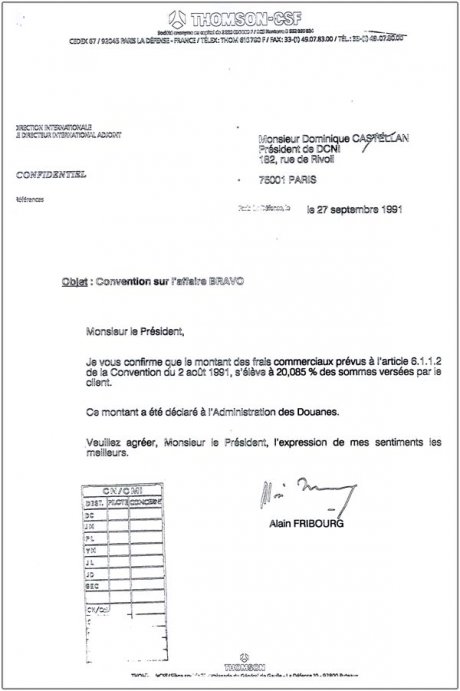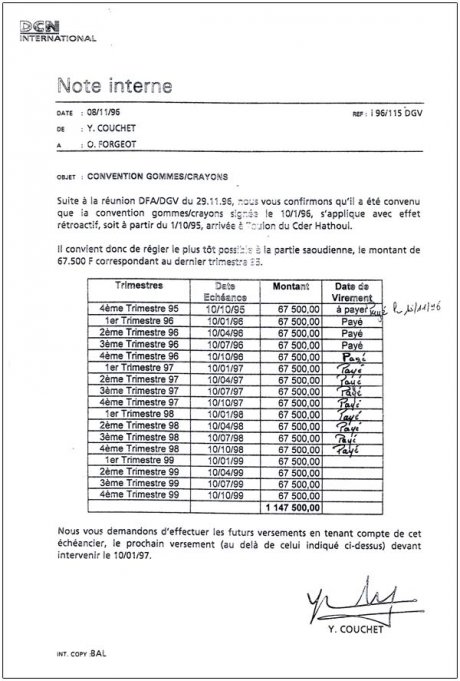
“Bakchich” was able to get their hands on confidential documents on the DCN upon which the justice didn’t really decide to investigate (but just charged people on secondary intelligence), and dissected the networks that allowed big commissions in the military market to disappear. Frigate sales, submarines, torpedo boats, and other boats : huge markets and their backstage that we started telling you about in the 1st part, made a huge sum of money evaporate. Newcomer in this saga is Ziad Takieddine, a middleman in the Balladur networks.
The first big market in which the DCNI was involved is the infamous frigates sold to Taiwan. Little reminder of the facts : in 1991, a consortium led by Thales (at the time Thomson-CSF) on behalf of the DCN and other French industrialists, signed with the nationalist island, the construction of 6 combat frigates. A humongous market that guarantees millions of hours of work for the employees of Lorient, the seaside city equipped with grand boatyards since 1770 when the Royal Armory was established there. For those infamous frigates, Thales acted on behalf of the French people for one simple reason : the DCN at that time being a state-owned company couldn’t negotiate directly with the Taiwanese government that wasn’t recognized by the international community. Therefore Thales provided the front for the DCN and the electronic group for defense then bills the DCN up to 70% through Sofrantem, a structure made available exclusively to the Ministry of Defense to support and manage the exportation of these frigates on a financial level. A nice money making factory.
Since September 1991, the intended commissions on the frigates are up to 20.085% of the total amount paid. Oh yeah, by the way the horrible word “commission” is not stated in the documents and letters related to this 2.5 billion euro contract. They only mention some obscure “Commercial fees”. This whole amount of money was still back in the days declared at the customs as we can see in the following document found by Bakchich. (see below)

"Mister President
I hereby confirm that the amount of the commercial fees planned in article 6.1.1.2 of the Convention of August 2nd 1991, represents 20.085% of the amount paid by the client.
This amount was declared at the Customs Administration."
The commissions on the frigates, some obscure “Commercial fees” The value of this market before the 1993 endorsement was worth 2.23 billion Euros. But the document signed by Alain Fribourg, at that time CEO Asia for Thales, doesn’t give us any details. On the first 1.83 billion, a commission of 16.5% was applied, for the rest of the amount the rate went up to 36.5%.
Of course, in the contract for the sales of these boats, article 18 clearly specifies that no commission will be given during this transaction. Precautions taken just to keep up appearances, when we know the in-depth of the big international markets… Incidentally a part of the contract leaves an open door to distribute commissions, explaining that if any new middlemen were to be involved in the negotiation of the market, both sides should be notified. Arbitration has been in progress for a couple years about that specific part of the contract between Thales and Taiwan.
In 1993, the contract was partially modified. Instead of parts of the hull being sold to Taiwan and assembled there by Chinese construction sites, it was decided that the boats would completely be built in France. “The industrial part of this contract that was supposed to go to the Chinese were transferred to the French, which explains the additional costs for Taipei" says an industrialist. For Taiwan, the invoice is increased by as much as 180 million Euros.
One of the key men of the commercial negotiations for the DCNI, Jean-Marie Boivin comes into play in 1994. He’s the man of financial schemes abroad who supervises discreet foreign corporations. Bakchich will give you a full portrait of this nice man in the next episode, but to not keep you readers in suspense, we will tell you about this unreleased story - we could even say grotesque. Some day in the end of the 1990s, there was a nice little meeting between Boivin and other executives from DCNI, a couple of representatives from Thales, as well as members of Andrew Wang’s family, the mysterious and essential middleman between France and Taiwan. We found out later that he received a total of 920 million dollars in his 46 bank accounts including 520 million from Thales.
The purpose of this meeting was to trade a check of 12.6 million Euros for original documents held by the middleman, kind of like a final settlement given to Wang in exchange of his discretion. We can thanks many years of good and loyal service to the company. Since then, Boivin has kept a handful of original documents in a safe place in some safe in Zurich in case anything happened and he might need them. A sort of life insurance policy… He was contacted by phone and by email by Bakchich for an interview but he didn’t wish to answer to our request. On Thales’ side, they assured us they have no memory of this meeting. Really ?
After the frigates and the submarines, the middlemen network of the DCNI will deploy themselves again, but this time for the sale of 3 attack class Agosta 90B submarines ordered by Pakistan on September 21 1994. This market which is worth 840million Euros was closed under the auspices of François Léotard, the minister of Defense under Edouard Balladur’s government. A couple months before the 1995 presidential elections, where Balladur had to get prepared to fight against Chirac and Jospin, the government tried to close as many big markets as possible. Various “consultants” were paid by the French to wheedle the Pakistani generals. But the award goes to this shady player in the weaponry sale : Ziad Takieddine. Bakchich has mentioned his hectic life… or not. Associated with this Lebanese person who sees Bénazir Bhutto’s husband and a Saudi person close to the King Fahd, Ali Bin Mussalam, he got into the Pakistani operation.
During summer 1994, two month before Léotard signed the sale of submarines to Islamabad, the DCNI through their vice president Emmanuel Aris signed a consulting contract to Takieddine through his Panama based company Mercor Finance. As the document below shows us, the happy man will receive 4% of the total value of the contract which is about 33 million Euros.
The consulting contract to Takieddine signed by the DCNI for the submarines sold to Pakistan.
Takieddine was told that he couldn’t transfer part or the total amount of his earnings to France, a French person or a French company : it’s better when it’s said… Bin Mussalam welcomed at Matignon several times by Léotard’s advisors, works hand in hand with Balladur’s teams.

But quickly in Pakistan, Pakistani marine admirals and officers were accused of receiving brown envelopes. Benazir Bhutto’s opposition rised up against Murtaza Bhutto the prime minister’s brother, her husband and the chief of staff. A high ranked officer was relieved from his duties in 1997. “Since the signature of this Pakistani contract, it has been surrounded with suspicion of corruption” wrote L’Express (a French weekly newspaper) in May 2002. “It has since then, according to a report of the French Court of Auditors written in October 2001, known significant difficulties such as a lack of volunteers, use of illegal assistance technique and various financial problems. The court estimated the loss to about 20% of the total value of the contract, or even 40% in case of failure to transfer the intended technology”. Takieddine’s associate sees his bank accounts in Switzerland blocked. We will see more details about him in the next episode of our saga. Things didn’t turn out so well either for Ziad…
But the presidential elections were coming soon and more and more contracts are being signed. After Pakistan, Saudi Arabia captivated Balladur’s government. The Saudis had already bought a first batch of frigates in 1980 (it was the Sawari I program estimated at 2.3 billion Euros). They then bought in 1994 new frigates that were twice as big this time. It’s the famous Sawari II contract for 2.9 billion Euros. As traditionally with the Arabia Kingdom, the weaponry contracts are signed State to State. The industrialists are not involved. A corporation regrouping the State and the manufacturer, Sofresa, oversaw the contract and everything around it. A consulting contract was signed in this way by Sofresa with Alin Bin Mussalam.
The latter who claims to be Sheikh, will receive a total of 340 million Euros in 10 years. Léotard closed the Sawari II operation with his Saudis counterpart, the prince Sultan in November 1994. Concerning Bin Mussalam, he also didn’t receive all he was promised in spite of the “balourd” applied to the contract. The “balourd” (French term used by specialists) ? It’s just a financial term meaning that we decide to choose an early installment instead of a progressive one of the balance of a predetermined amount. A “balourd” had been decided for the installment of commissions.
Next to those “Mammoths contracts” where parts of the total amount tend to disappear by tens of millions Euros, there are smaller markets where little arrangements were done. If the DCNI wasn’t involved in the Sawari II market, they were involved in the “Mouette” contract, the scheduled maintenance of the Sawari I boats and two oil tankers (470 million Euros signed in 1994). In January 1996, the DCN and DCNI accepted according to a 1996 document found by Bakchich, to participate “by a voluntary contribution to the financing of expenses of the operating budget of any nature” of Saudis marines installed in Toulon during the time of the contract.

The General Inspection of Finances that started looking at "Mouette"in 1998 calculated that this case had already cost two years before it ended, a loss of 180 million euros. What would it be if it had known about the “Pencil-eraser Convention”…
Soon, the follow up of Bakchich’s Saga with the portrait of the key man in the DCNI, Jean Marie Boivin.
To read the first episode of our exposure, click here.
Translated by Jacky Chen
